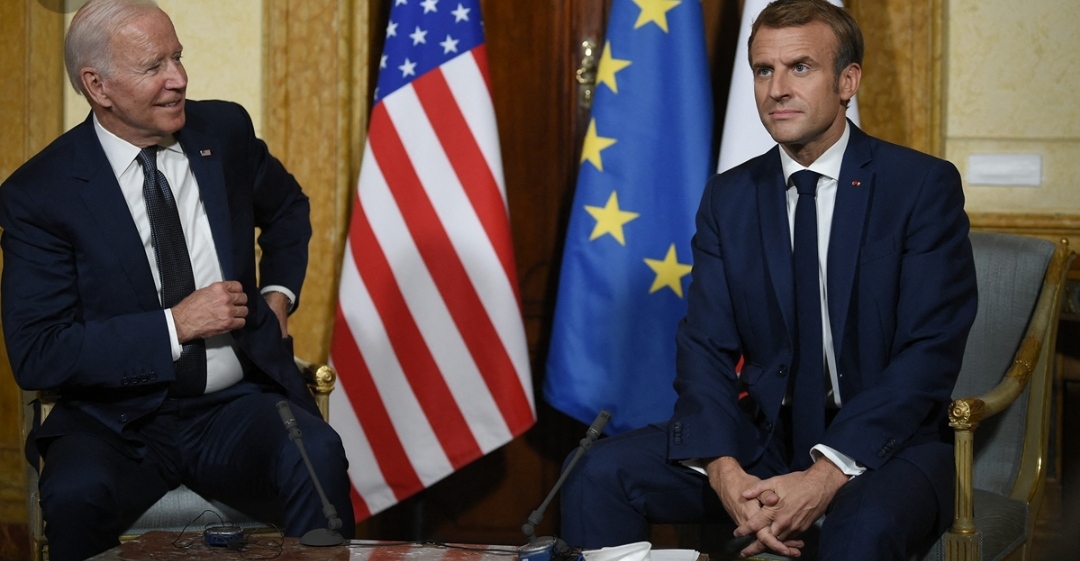Drama and trauma of the great-power politics

By
Xin Ping
When the cameras turned to US President Joe Biden, Australian Prime Minister Scott Morrison and British Prime Minister Boris Johnson, the just-concluded G20 summit and the ongoing COP26 summit were dramatic. Except for few tangible results over global issues, their entangled relations with French President Emmanuel Macron made perfect plot for modern political TV dramas.
Previously, Australia abruptly cancelled a multi-billion-dollar contract to buy French diesel-electric submarines and instead decided to go with US nuclear-powered submarines. The decision was part of an Indo-Pacific pact between Australia, the UK and the US. The pact, known as AUKUS, infuriated France, which recalled its ambassadors to the US and Australia over the lost deal.
Grievances and grudges among the four leaders exploded during their first major face-to-face gatherings since the pandemic broke out, overshadowing other much more essential topics concerning the future of the world.
Asked whether he thought Morrison lied to him over the cancellation of the submarine contract, Macron responded in an unusually blunt way: “I don’t think, I know.” Things became more dramatic when Australian sources leaked one of Morrison’s private messages with Macron who said in reply: “Should I expect good or bad news for our joint submarines ambitions?” After failing to prove that Macron had been informed about the deal in advance, Morrison further embarrassed himself by hyping up the drama.
“We have no eternal allies, and we have no perpetual enemies. Our interests are eternal and perpetual,” This “golden rule” of international relations was put forward by former British prime minister Viscount Palmerston but is often forgotten by many. Holding the US as a “dear friend,” Morrison may have become bewildered when Biden and Macron publicly displayed their affection in front of the media.
In a bid to mend fences with Macron, Biden made a humble gesture by admitting that the matter could have been handled better. “What we did was clumsy. It was not done with a lot of grace,” said Biden, hours after arriving in Italy for the G20 summit. “I was under the impression that France had been informed long before that the deal was not coming through,” said Biden, the older, wiser politician, skillfully shifting part of the blame to Australia.
After this rapprochement, the two countries issued a joint statement confirming US support for France to develop a “stronger and more capable European defense” as a complement to NATO. Macron then told reporters, “Trust is like love, declarations are good, but proof is better.”
Only time will tell how firm US fidelity will be this time.
Meanwhile, tension remains in France-UK relations. Besides the skirmish over AUKUS, Macron and Johnson met privately during the G20 summit to try and resolve an escalating spat over fishing in the English Channel, but the two appeared further apart afterward as they gave starkly differing versions of the meeting’s outcome. Macron even left the COP26 summit a day earlier than other world leaders. Compared with the submarines, which are expected to take years to build, the fishing row between the two seems to be a bigger thorn in their already souring relations.
While the four countries are obsessed with the wheeling-and-dealing over the submarine issue, there seems to be no winner in this eye-catching political drama. Australia may come to realize its role as a political pawn in the whole game. France, having a transient taste of being the one in control, lost its deal anyway. The US, seeing its geopolitical greed and Americentrism exposed, almost failed a longtime ally. Britain, caught in between, is faced with more conundrums with France.
As the spotlight dims, only one thing rings true: Great-power politics leaves nothing but drama for outsiders and trauma for the ones involved.




